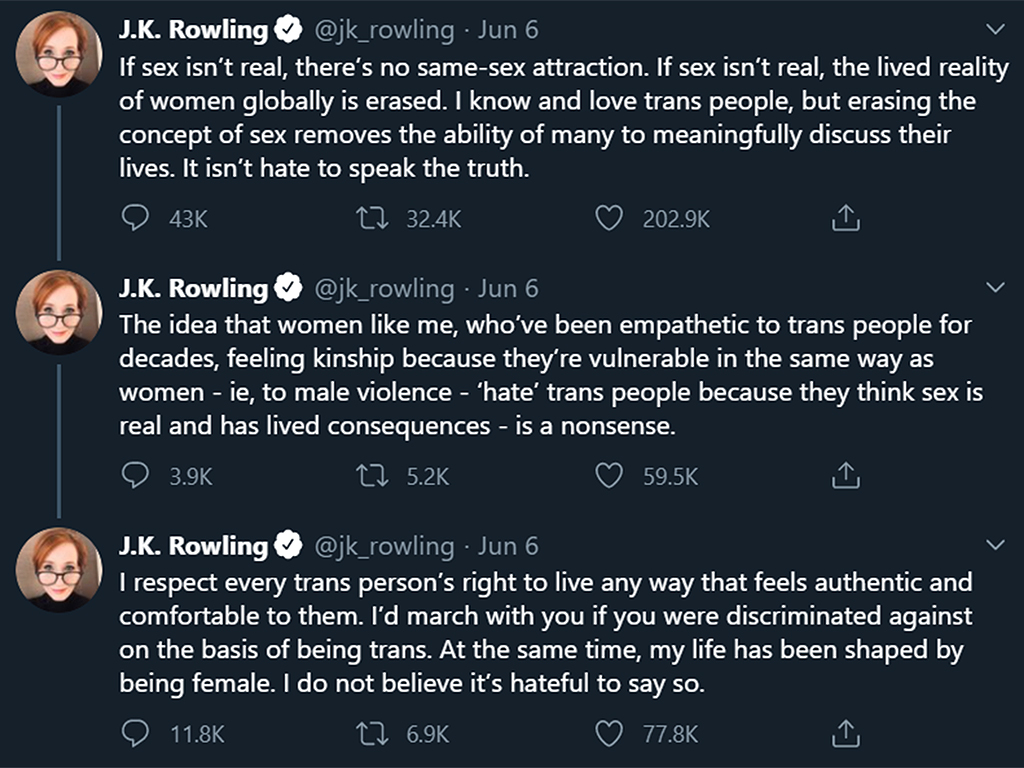Harry Potter film star Daniel Radcliffe has apologized to members of the LGBTQ2 community for a series of tweets shared by author J.K. Rowling last weekend.

“To all the people who now feel that their experience of the (Harry Potter) books has been tarnished or diminished, I am deeply sorry for the pain these comments have caused you,” the 30-year-old actor wrote in a brief statement on The Trevor Project‘s website on Monday. “I really hope that you don’t entirely lose what was valuable in these stories to you.”
Radcliffe made the statement after Rowling’s recent comments about biological sex and gender identity on Twitter, which supporters of the trans community called “offensive” and “dismissive.”
The comments began last Saturday when the 54-year-old novelist took particular umbrage with the headline of an opinion piece published by Devex, which reads: “Creating a more equal post-COVID-19 world for people who menstruate.”
“People who menstruate’?” Rowling wrote in response on Twitter. “I’m sure there used to be a word for those people. Someone help me out. Wumben? Wimpund? Woomud?”
As a result, the Gloucestershire-born author quickly became the subject of major backlash — specifically from the trans community — with many social media users pointing out that people aren’t required to menstruate in order to be considered a woman or vice-versa.
According to the Canadian Institutes of Health Research, sex is based on biological attributes such as physical and physiological features, including chromosomes and reproductive organs, while gender “refers to the socially constructed roles, behaviours, expressions and identities of girls, women, boys, men and gender-diverse people.”
“Ah yes, J.K. Rowling proving once again that she is transphobic and dismissive of trans people,” tweeted one user in response.

Get daily National news
“Menopausal women don’t menstruate, women who’ve had hysterectomies don’t menstruate, trans women don’t menstruate, so are they all just not women now? No,” they concluded.
“You can write a whole magical world but can’t fathom that trans men exist?” asked British author Beth McColl. “I haven’t had a period since 2017. Has my womanhood been paused until I can summon one?”
Though Radcliffe acknowledged that Rowling had essentially helped launch his career by creating the Harry Potter series and character, he said that he felt “compelled” to address her comments in the statement, as for the last decade, he has been actively involved with The Trevor Project, a U.S.-based suicide prevention hotline for LGBTQ2 youth.
“Transgender women are women,” he wrote on the website. “Any statement to the contrary erases the identity and dignity of transgender people and goes against all advice given by professional health-care associations who have far more expertise on this subject matter than either Jo or I.”
The Woman in Black actor then admitted that he was “still learning how to be a better ally” to the trans community.
His statement also included a Trevor Project educational resource that “covers a wide range of topics, including the differences between sex and gender, and shares best practices on how to support transgender and non-binary people.”
Radcliffe later reiterated his hopes that Rowling’s comments would “not taint” how readers perceive the Harry Potter stories.
“If you believe that a particular character is trans, non-binary or gender fluid, or that they are gay or bisexual; if you found anything in these stories that resonated with you and helped you at any time in your life — then that is between you and the book that you read, and it is sacred,” he wrote.
Radcliffe is best-known for his portrayal of the beloved title character in the Harry Potter film franchise, which was released between 2001 and 2011.
The eight movies were not only inspired by Rowling’s smash-hit fantasy novels, but she helped filmmakers with many decisions during their respective productions.
Following widespread criticism, Rowling tried to explain to her fans that she never intended to offend the trans community. In followup Twitter posts, however, she continued to repeat that biological “sex is real.”
“If sex isn’t real, there’s no same-sex attraction,” she wrote hours after the initial tweet. “If sex isn’t real, the lived reality of women globally is erased.
“I know and love trans people, but erasing the concept of sex removes the ability of many to meaningfully discuss their lives.
“My life has been shaped by being female. I do not believe it’s hateful to say so,” Rowling concluded in another tweet.
Rowling’s attempt to defend herself resulted in further backlash, however, as many more people continued to try and explain the difference between biological sex and gender.
“Sex and gender are not the same thing,” replied one Twitter user. “Trans women face misogyny. The only erasure I see here is trans fem erasure.”
“Sex isn’t the same as gender, it’s not hard to understand,” tweeted another.
While he did not explicitly defend or condemn Rowling, Radcliffe told readers that his speaking out against Rowling was not a case of any “in-fighting” between the two former colleagues, but simply because he felt “compelled” to address it.
“That is really not what this is about,” he concluded. “Nor is it what’s important right now.”
— With files from Reuters










Comments
Want to discuss? Please read our Commenting Policy first.